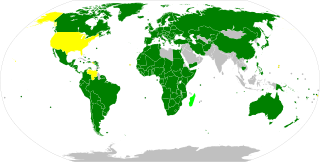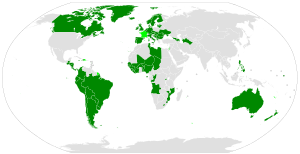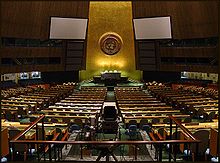The European Convention on Nationality was signed in Strasbourg on 6 November 1997. It is a comprehensive convention of the Council of Europe dealing with the law of nationality. The convention is open for signature by the member States of the Council of Europe and the non-member States which have participated in its elaboration and for accession by other non-member States. The Convention came into force on 1 March 2000 after ratification by 3 countries. As of 2021, the convention has been signed by 29 countries and ratified by 21 of those countries.
Nationality is the status of belonging to a particular nation, defined as a group of people organized in one country, under one legal jurisdiction, or as a group of people who are united on the basis of culture.

Naturalization is the legal act or process by which a non-national of a country acquires the nationality of that country after birth. The definition of the International Organization for Migration of the United Nations does not include automatic acquisition that is not initiated by the individual concerned or his or her legal agent or acquisition of nationality by declaration. It usually involves an application or a motion and approval by legal authorities. The rules of naturalization vary from country to country but typically include a promise to obey and uphold that country's laws and taking and subscribing to an oath of allegiance, and may specify other requirements such as a minimum legal residency and adequate knowledge of the national dominant language or culture. To counter multiple citizenship, some countries require that applicants for naturalization renounce any other citizenship that they currently hold, but whether this renunciation actually causes loss of original citizenship, as seen by the host country and by the original country, will depend on the laws of the countries involved.

Jus soli, meaning 'right of the soil', is the right of anyone born in the territory of a state to nationality or citizenship, also commonly referred to as birthright citizenship in some Anglophone countries, is a rule defining a person's nationality based on their birth in the territory of the country.
In international law, a stateless person is someone who is "not considered as a national by any state under the operation of its law". Some stateless people are also refugees. However, not all refugees are stateless, and many people who are stateless have never crossed an international border. At the end of 2022, the United Nations High Commissioner for Refugees estimated 4.4 million people worldwide as either stateless or of undetermined nationality, 90,800 (+2%) more than at the end of 2021.
Refugee law is the branch of international law which deals with the rights and duties states have vis-a-vis refugees. There are differences of opinion among international law scholars as to the relationship between refugee law and international human rights law or humanitarian law.

A certificate of identity, sometimes called an alien's passport, is a travel document issued by a country to non-citizens residing within their borders who are stateless persons or otherwise unable to obtain a passport from their state of nationality. Some states also issue certificates of identity to their own citizens as a form of emergency passport or otherwise in lieu of a passport. The visa requirements of certificates of identity may be different from those of regular passports.

The Convention Relating to the Status of Refugees, also known as the 1951 Refugee Convention or the Geneva Convention of 28 July 1951 is a United Nations multilateral treaty that defines who a refugee is and sets out the rights of individuals who are granted asylum and the responsibilities of nations that grant asylum. The Convention also sets out which people do not qualify as refugees, such as war criminals. The Convention also provides for some visa-free travel for holders of refugee travel documents issued under the convention.
Nationality law is the law of a sovereign state, and of each of its jurisdictions, that defines the legal manner in which a national identity is acquired and how it may be lost. In international law, the legal means to acquire nationality and formal membership in a nation are separated from the relationship between a national and the nation, known as citizenship. Some nations domestically use the terms interchangeably, though by the 20th century, nationality had commonly come to mean the status of belonging to a particular nation with no regard to the type of governance which established a relationship between the nation and its people. In law, nationality describes the relationship of a national to the state under international law and citizenship describes the relationship of a citizen within the state under domestic statutes. Different regulatory agencies monitor legal compliance for nationality and citizenship. A person in a country of which he or she is not a national is generally regarded by that country as a foreigner or alien. A person who has no recognised nationality to any jurisdiction is regarded as stateless.

The Convention Relating to the Status of Stateless Persons is a 1954 United Nations multilateral treaty that aims to protect stateless individuals.
The Russian Federation's Law on Refugees defines who is a refugee for purposes of obtaining asylum in the country. The Law defines a refugee as a "person who is outside their country of nationality or habitual residence; has a well-founded fear of persecution because of their race, religion, nationality, membership in a particular social group or political opinion; and is unable or unwilling to avail themself of the protection of that country, or to return there, for fear of persecution". Upon receiving an asylum seeker's application, the Russian Migration Service determines whether the asylum seeker meets the legislative definition of a "refugee" and should be granted asylum.
The subject of birth aboard aircraft and ships is one with a long history in public international law. The law on the subject is complex, because various states apply differing principles of nationality, namely jus soli and jus sanguinis, to varying degrees and with varying qualifications.

Ukrainian nationality law details the conditions by which a person holds nationality of Ukraine. The primary law governing these requirements is the law "On Citizenship of Ukraine", which came into force on 1 March 2001.

Azerbaijani nationality law is regulated by the Constitution of Azerbaijan, as amended; the Citizenship Law of Azerbaijan and its revisions; and various international agreements to which the country is a signatory. These laws determine who is, or is eligible to be, an Azerbaijani national.

Albanian nationality law is based on a mixture of the principles of Jus sanguinis and Jus soli. In other words, both place of birth and Albanian parentage are relevant for determining whether a person is an Albanian citizen. It is regulated by the "Law on Albanian Citizenship". In some circumstances citizenship is granted to children born in Albania to non-Albanian parents. This is not the case where parents are temporary or short-term visitors. As suggested by the United Nations and Council of Europe, all efforts are made in order to avoid statelessness.
The nationality law of Bosnia and Herzegovina governs the acquisition, transmission and loss of citizenship of Bosnia and Herzegovina. Regulated under the framework of the Law on Citizenship of Bosnia and Herzegovina, it is based primarily on the principle of jus sanguinis.

Somaliland a self-declared independent country in the Horn of Africa in which inhabitants were initially governed by various kinship networks. Upon contact with Europeans, treaties were signed in the area to secure rights to trade in the territory in exchange for protection of clans from rivals. Britain formally extended a protectorate over British Somaliland in 1898. Inhabitants of Somaliland were British Protected Persons from that date until they gained their independence in 1960 and joined in the union of their state with Italian Somaliland to form the Somali Republic. Inhabitants derive their nationality from Somali law. The legal means to acquire nationality, formal legal membership in a sovereign nation, differ from the domestic relationship of rights and obligations between a citizen within its nation, known as citizenship. Nationality describes the relationship of an individual to the nation under international law, whereas citizenship is the domestic relationship of an individual within the state. As the African Union, United Nations, and no independent nation has recognized its national sovereignty, Somaliland's inhabitants are Somali nationals, but since declaring its independence in 1991, it has de facto authority to control internal affairs and citizenship within its territory.
Paul Weis was an Austrian lawyer and survivor of the persecution by the Nazis. He is dubbed to be the "founding father of the protection".

The Convention on Certain Questions Relating to the Conflict of Nationality Laws was a League of Nations convention adopted during the League of Nations Codification Conference, 1930 in The Hague. It was signed by many states, but ratified by only twenty-three.
A stateless person is, according to article 1 of the New York Convention relating to the Status of Stateless Persons of 28 September 1954, "any person who is not considered as a national by any State under the operation of its law".












